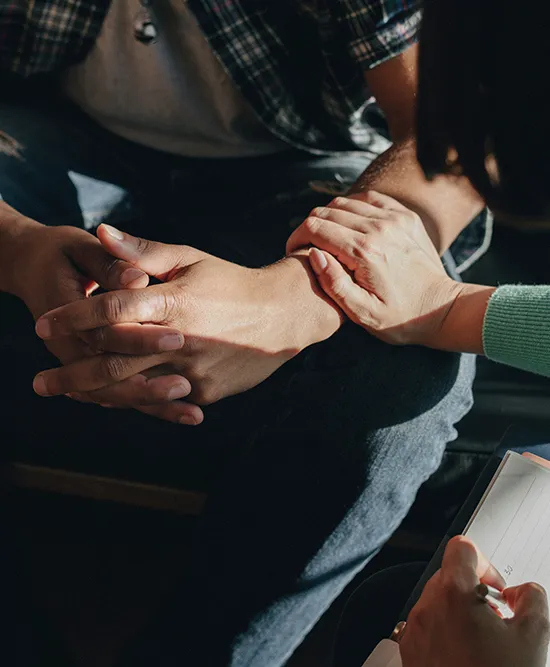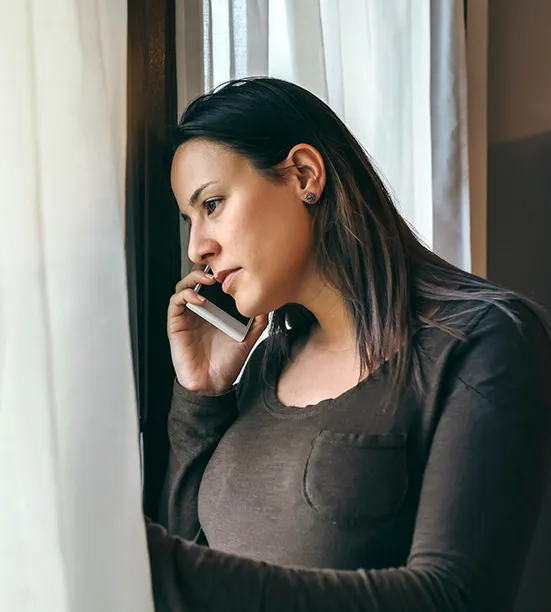
Get Help
A Resource for Compassionate and Timely Support
Welcome to the Iowa Victim Service Call Center, where we believe every person deserves compassionate and unwavering support to overcome trauma, hardships, and any of life’s challenges.
Serving the state of Iowa, our call center is equipped to provide each person with assistance and guidance. Recognizing the urgency of timely support, we remain accessible 24 hours a day, 365 days a year, ensuring help is always within reach when it’s needed most.
Our team of advocates undergoes comprehensive training to offer expert assistance to individuals facing a range of challenges, from domestic violence and human trafficking to elder abuse, sexual assault, homicide, hate crimes, and much more. Whether or not you’ve reported your experience, we’re here to support you in any way you need. Your well-being and recovery are our top priorities.
Central to our mission is our extensive database, meticulously curated to encompass every resource available in Iowa. Whether you’re in need of guidance to a nearby homeless shelter, a food bank, victim services, law enforcement agencies, or medical facilities, our aim is to ensure that every caller receives prompt access to the support they require, regardless of their location within Iowa.
At our center, we are dedicated to fostering a community of support and empowerment, where individuals can find help, hope, and resources to navigate difficult situations.



We’re Here to Listen
You’re welcome to call us to discuss any past or current trauma you’ve experienced. We understand that trauma can take many forms and can be deeply impactful on one’s life.
Whether it’s a recent event or something from your past that you’ve never shared with anyone, we’re here to listen with compassion and without judgment. Trauma can include experiences such as physical or emotional abuse, accidents, natural disasters, witnessing violence, or any event that has left you feeling overwhelmed, scared, or powerless. Our service is confidential and affirming, meaning you can trust that your privacy will be respected, and you’ll be met with understanding and support, regardless of your circumstances. We’re here to provide a safe space for you to express yourself and to help you navigate your journey towards healing and recovery.

We’re Confidential and Anonymous
We understand that reaching out for support can be daunting, particularly for those who have never opened up about their experiences before.
That’s why our statewide hotline provides a safe and confidential space where callers can share as much or as little as they feel comfortable with, without any pressure. Whether it’s the first time you’re speaking about your ordeal or if you’re hesitant to disclose personal details, you have the freedom to remain anonymous if you wish. What matters most is taking that initial step towards reaching out and engaging with someone who cares. Your well-being is our priority, and we’re here to listen, support, and assist you on your journey towards healing, no matter where you are in that process.

You Can Text Us, Too
Recognizing the diverse needs and preferences of those seeking support, we provide a dedicated text line as an option to reach out to us.
We understand that some individuals may feel more at ease expressing themselves through text, and our advocates are available around the clock to respond promptly to any messages received. If texting is your preferred method of communication, simply send the keyword IOWAHELP to 20121, and one of our trained advocates will be there to offer assistance and support whenever you need it.
Whether you’re facing a crisis, seeking guidance, or simply want someone to talk to, our text line provides a discreet and accessible avenue for reaching out. Your comfort and well-being are paramount to us, and we’re committed to ensuring that help is always within reach, in the manner that suits you best.
This project was supported by Grant No. 15JOVW-24-GG-01007-RURA awarded by the Office on Violence Against Women, U.S. Department of Justice. The opinions, findings, conclusions, and recommendations expressed in this publication/program/exhibition are those of the author(s) and do not necessarily reflect the views of the U.S. Department of Justice.
